Verb tenses are used to express when an action is taking place.
-
Past actions:
-
have already happened
-
are finished
-
Present actions:
-
are repeated
-
are facts, beliefs & generalizations
-
are happening now
-
are a result of past actions
-
Future actions:
-
haven't happened yet
-
are taking place at a future time
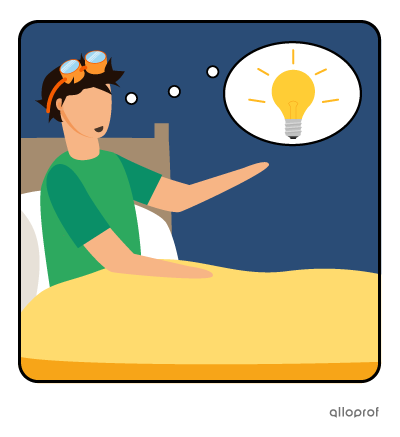
Last night, Hubert the inventor finally solved the problem he was having on his project.
Actions are completed.
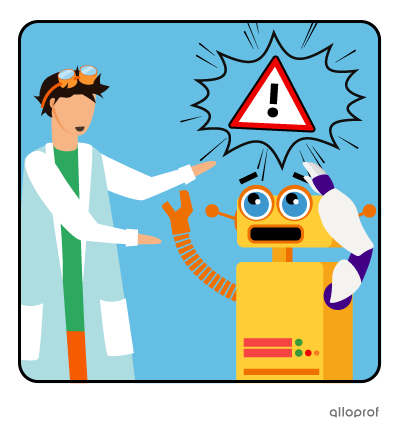
“It is an excellent idea! I’m telling you!”
Actions are repeated regularly or are in progress.
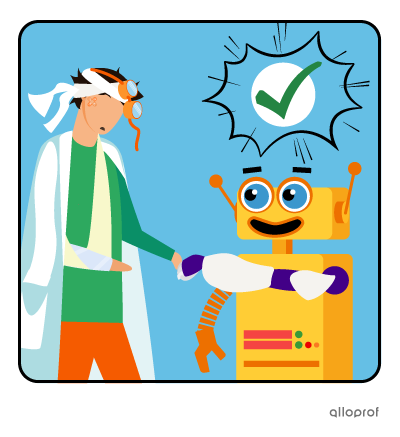
“Okay, next time I will listen to you. It will be safer.”
Actions are expected to happen in the future.
Simple Past
-
past actions
-
completed actions or events
Simple Present
-
regular repeated actions or events
-
facts and generalizations
Simple Future
-
actions or events taking place at a future time
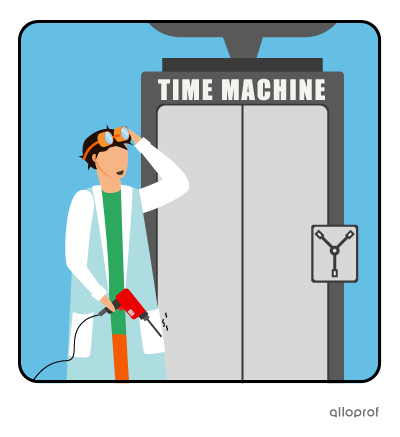
Hubert was happy with the time machine he just finished.
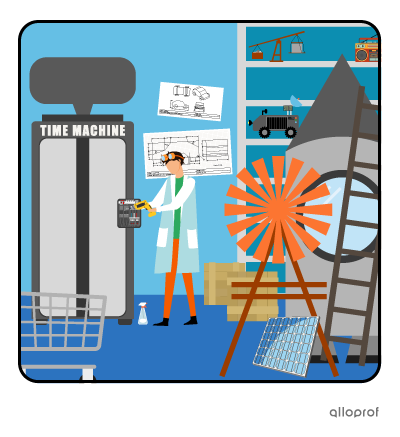
He is an inventor and he builds a lot of machines.
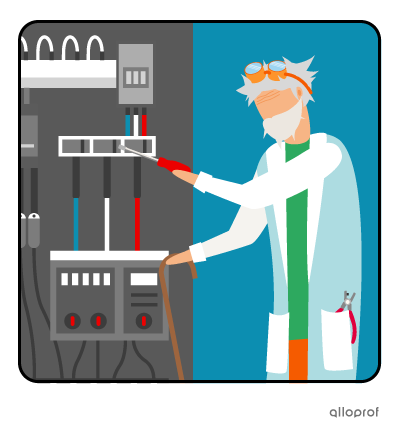
Hubert will work on his inventions as long as he can.
Past Continuous
-
also known as the past progressive
-
past actions or events
-
an action interrupted by another action
-
actions still in progress at a particular time in the past
-
often used with the simple past
Present Continuous
-
also known as the present progressive
-
present actions or events
-
actions still in progress at the moment
-
temporary habits and routines
Future Continuous
-
also known as the future progressive
-
future actions or events
-
actions still in progress at a particular time in the future
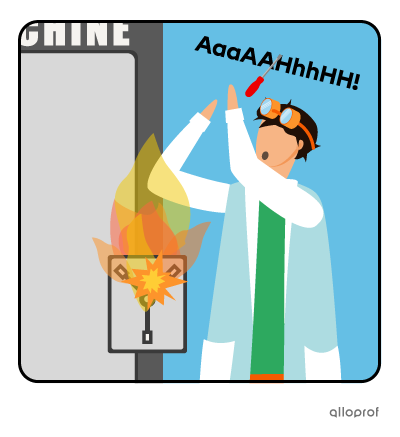
The machine caught fire while he was testing it.
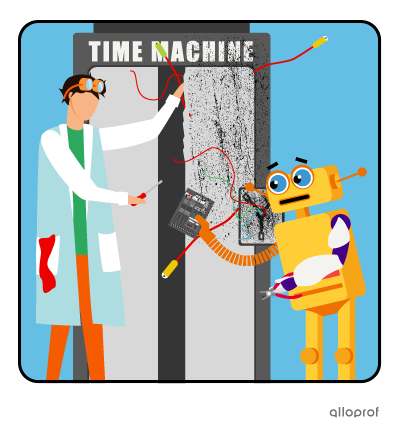
Hubert and his assistant are fixing the machine because of yesterday’s incident.
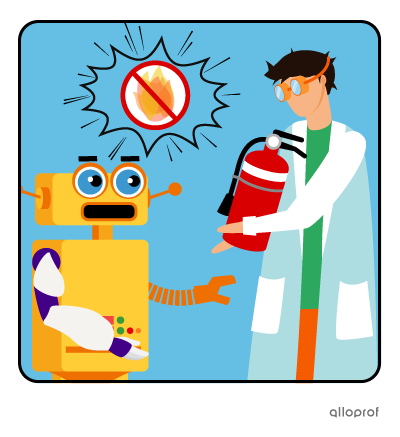
Hubert will be taking no chances when they test the time machine again tonight.
Past Perfect
-
actions or events which happened before other actions or events in the past
-
often used with the simple past
Present Perfect
-
past actions or events with a present result
-
actions or events happened at indefinite time
Future Perfect
-
actions or events completed in the future
-
often used with time expressions
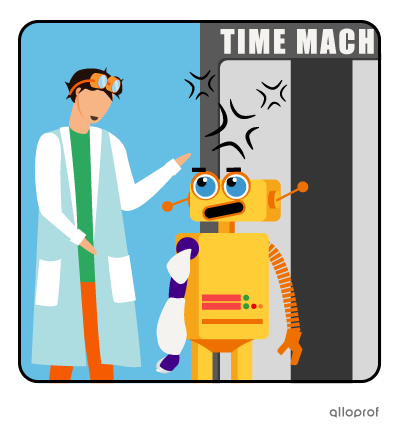
The assistant agreed to test the machine because Hubert had promised it would be safe.
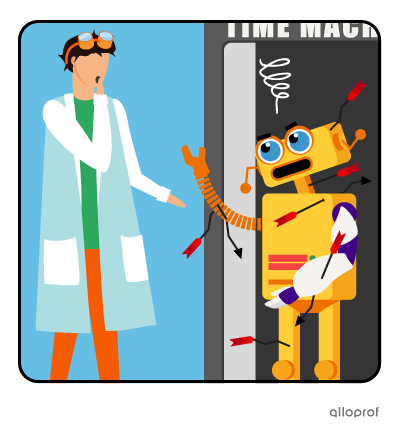
The assistant has come back from his time travel with some souvenirs.
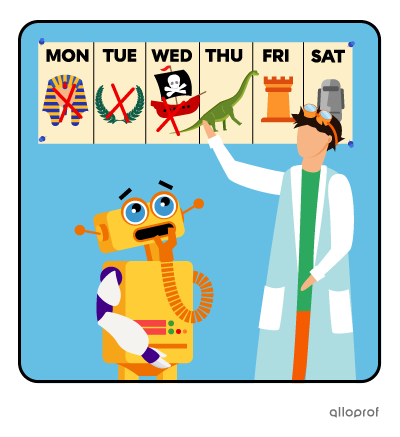
The assistant will have visited many time periods by the end of the week.
Past Perfect Continuous
-
actions or events that began, continued and were completed in the past
-
actions or events that continued up to a moment in the past
Present Perfect Continuous
-
actions or events began in the past and are still continuing
-
actions or events’ duration
Future Perfect Continuous
-
actions or events that will be continuing in the future
-
actions or events’ duration
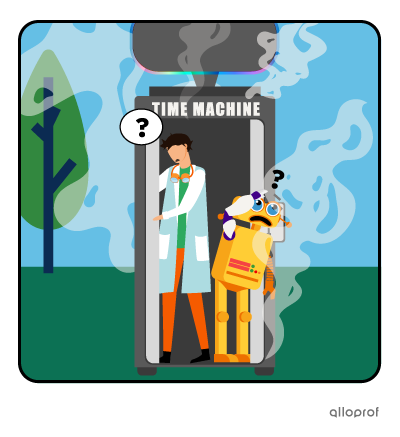
Hubert and his assistant had been travelling back to the present when the machine broke down.
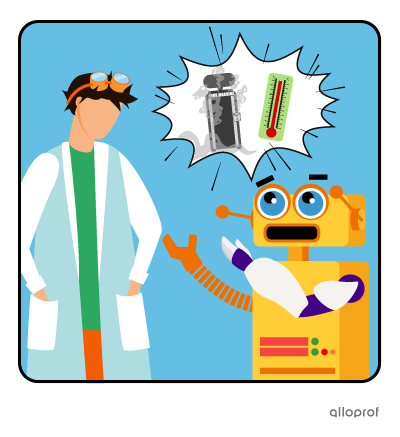
The machine has been working for 24 hours non stop, it needs to cool down.
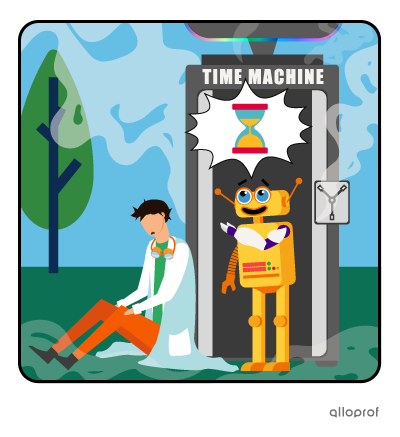
The machine will have been cooling down for a full hour in 3 minutes.
Signal words are keywords that can indicate when actions are taking place or give context to the situation.
Signal words can be placed:
-
At the beginning of the sentence:
Every morning, Hubert drinks a lot of coffee.
Yesterday, he drank only one cup of coffee.
-
At the end of the sentence:
Hubert drinks a lot of coffee every morning.
He drank only one cup of coffee yesterday.
-
Between a verb and its auxiliary:
Hubert is currently drinking a cup of coffee.
He has always taken his coffee with sugar.
| Simple Past | |
| yesterday | Yesterday, Hubert visited Albert Einstein. |
| the other day | He met Leonardo da Vinci the other day. |
| before | Before all that, he fixed his time machine. |
| […] ago | Ten years ago, Hubert read The Time Machine by H. G. Wells. A few days ago, he read it for the hundredth time. |
| last [...] | Last year, he started construction of his own time machine. Last night, he fell asleep in his workshop. |
| in [...] | In his spare time, he built a robot. He learned a lot about coding in the process. |
| Past Continuous | |
| while | The assistant was checking the electronics while Hubert was sleeping. |
| when | The assistant was rebuilding a circuit when Hubert woke up. |
| as | Hubert finished his coffee as his assistant was starting up the machine. |
| at […] | This morning at 11:21 Hubert and his assistant were working together. At midnight, they were still making modifications to the circuit boards. |
| Past Perfect | |
| already | Hubert had already eaten his sandwich when the phone rang. |
| just | He had just started his work again. |
| never | Hubert had never dreamed his machine would work so well. |
| not yet | He had not tried all the possibilities yet. |
| once | Once the assistant had completed an installation, Hubert would always add another feature to the machine. |
| until | They tested the machine until it had given the proper results. |
| Past Perfect Continuous | |
| for | Hubert had been working for hours when his computer crashed. |
| since | The computer had been acting weird since he had updated it. |
| how long | They weren’t sure how long the computer had been having these issues. |
| before | Everything had been going so well before the computer crashed. |
| the whole […] | The robot assistant had been looking for software issues the whole week. The software had been causing bugs the whole time. |
| all […] | The system had been giving them trouble all month. Hubert had been running diagnostics all day. |
| when | They had been making progress when the power went out. |
| Simple Present | |
| always | Hubert always drinks coffee before going to work. |
| never | He never takes sugar in his coffee. |
| often | Hubert often gets his best ideas while drinking his third coffee. |
| seldom | Hubert seldom takes time off from work. |
| rarely | He rarely goes on vacation. |
| usually | He usually works seven days a week. |
| normally | He normally listens to smooth jazz while working. |
| sometimes | He sometimes uses a record player to listen to it. |
| occasionally | Hubert occasionally buys tickets to see his favourite artists. |
| on […] | Huberts eats lunch in his workshop on weekdays. He has dinner at the restaurant on Fridays. |
| every […] | Hubert writes a to-do list every night before going to bed. Every time he gets an idea, he adds it to the list. |
| Present Continuous | |
| at the moment | At the moment, the robot assistant is painting the atomic toaster. |
| now | He is now adding the protective coat. |
| currently | The robot assistant is currently inspecting the plutonium power cell. |
| presently | He is presently placing it in the atomic toaster. |
| still | The atomic toaster is still glowing from all this power. |
| Present Perfect | |
| already | Hubert has already visited the past with his time machine. |
| ever | Has he ever met any historical figures? |
| up to now | Hubert has met a few historical figures up to now. |
| so far | So far, he only has spoken to Leonardo da Vinci. |
| yet | He hasn’t yet talked to Nikola Tesla though. |
| just | Hubert has just come back from visiting Ancient Egypt. |
| never | He has never travelled further in time than that. |
| not yet | The time machine hasn’t yet proven to be safe enough for longer trips. |
| until | Until now, Hubert has been very careful with the time machine. |
| up to now | Up to now, everything has gone smoothly. |
| since | Since day one, Hubert has worked nonstop on his time machine. |
| how long? | How long has Hubert dreamt of his time machine? |
| for | He has thought about it for years! |
| Present Perfect Continuous | |
| all […] | Hubert and his assistant have been looking for a new project all year. They have been brainstorming about it all week. |
| for […] | Hubert has been writing down ideas on sticky notes for days. His robot assistant has been recording the information for at least as long. |
| since […] | The robot assistant has been having some quiet time since Hubert fell asleep. They both have been racking their brains for ideas since Monday. |
| the whole […] | Hubert has been sleeping the whole time the robot assistant tidied up the workshop. Multiplying quantities of sticky notes have been invading the workshop the whole week. |
| how long? | “How long have I been sleeping?” Hubert asked, barely awake |
| Simple Future | |
| next […] | Hubert will come back from Tokyo next Monday. Next week, he will fly to Alaska. |
| tomorrow | Hubert’s assistant will join him tomorrow. |
| in […] | They will travel together more often in the future. In 2 years, Hubert will go to the Moon. |
| this […] | Hubert will plan his next trip this evening. His robot assistant will buy the plane tickets this weekend. |
| the […] after […] | They will pack their suitcases the day after tomorrow. They will visit a science and technology convention the week after they arrive. |
| maybe | Maybe Hubert will find some inspiration at the convention. |
| perhaps | He will perhaps meet a few old friends. |
| probably | Visiting the convention will probably take most of the week. |
| if | They will stay longer, if they think it is worth it. |
| Future Continuous | |
| tomorrow | Hubert will be starting his new project tomorrow. |
| at […] […] | He will be working on it intensely at 2 p.m. this afternoon. His assistant will be outlining a plan at this time tomorrow. |
| by […] | They will be designing the machine by the end of the week. By 3 o’clock today, they will be figuring out their R&D budget. |
| next […] | Hubert will be buying some equipment next week, for sure. They will be assigning different tasks to each other next Monday. |
| in […] | In a few minutes the robot assistant will be completing his research. Hubert will be putting together a work schedule in the next few days. |
| the […] after […] | They will be solving all kinds of problems the day after they have started the project. It will be entertaining to watch them the moment after they start arguing. |
| Future Perfect | |
| tomorrow | Hubert’s assistant will have fixed the time machine sometime tomorrow. |
| by […] | By Friday, they will have put the time machine back together. They will have tested it thoroughly by the end of the year. |
| next […] | Hubert will have run 147 tests on the machine the next time he runs one. Next week, they will have completed the new software updates. |
| in […] | The robot assistant will have built the new power supply in a few hours. Hubert will have put together the control system in a month or so. |
| the […] after […] | They will have assembled the controls the week after spring break. The day after this assembly, they will have done about 20% of the work. |
| Future Perfect Continuous | |
| for […] | In 10 minutes, Hubert will have been using the time machine for 48 hours straight. The robot assistant will have been monitoring the data for days when Hubert comes back. |
| by […] | The time machine will have been cooling a little by the time the next trip is ready. By July, they will have been travelling in time almost every day. |
| all […] long | They will be tired when they come back, because they will have been visiting many time periods all week long. Hopefully, the time machine will not have been giving them trouble all day long. |
| the […] after […] | The day after they arrive, they will have been going through historical events for a long time. The week after Labour Day, Hubert and his assistant will have been working for 365 days straight. |
The conditionals and the imperative are not verb tenses: they are verb moods. Where verb tenses indicate the time when an action is taking place, verb moods express the speaker’s attitude.
The conditional mood expresses that a condition must be met for something to happen.
It often uses the:
-
modals: could, would or should
-
conjunction: if
Several verb tenses are used to express the conditional mood.
For example:
-
If Hubert found the time, he would fix his time machine.
-
If Hubert fixes his time machine, he will travel to the future.
-
If Hubert had fixed the time machine, he would have travelled to the future.
The imperative mood gives a command or makes a request. It uses the base form of the verb and the subject is implied, not written nor said.
For example:
-
Fix the machine.
-
Don’t speak so loud.
-
Help me!